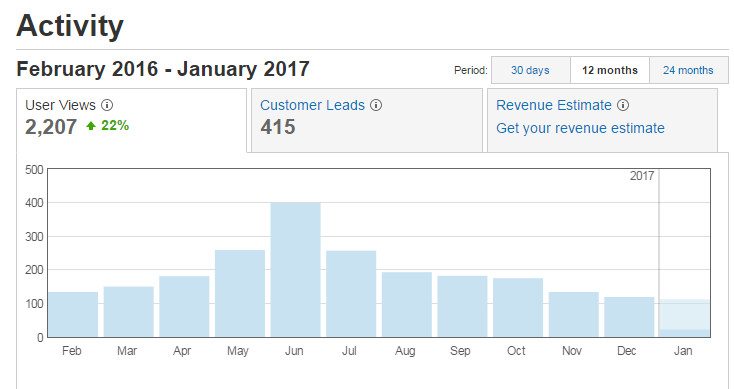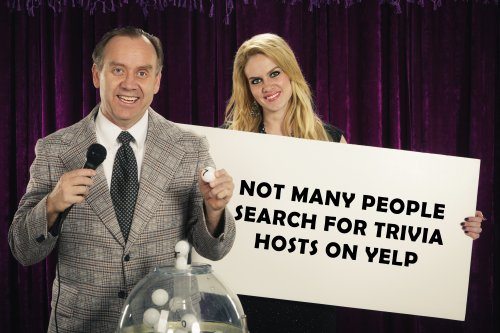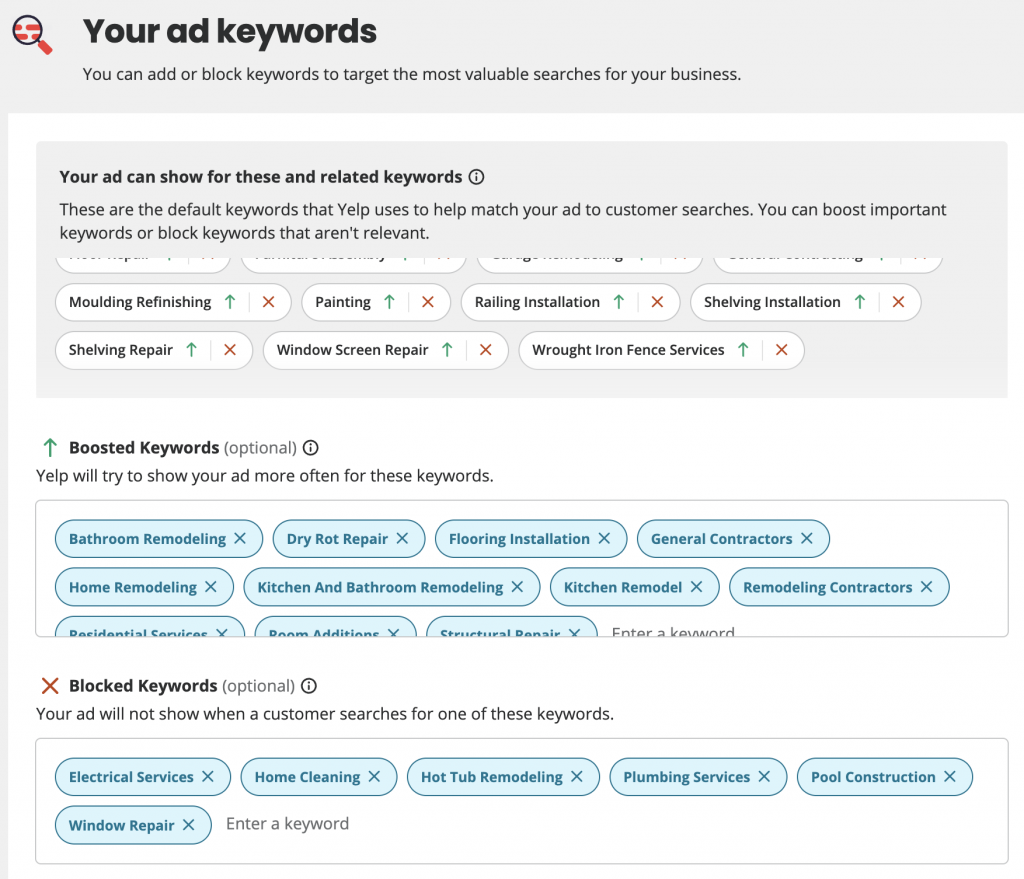The Yelp Advertising Exposé: The Most Complete Review of Advertising on Yelp
You have a Yelp sales agent calling you to advertise with them.
The advertising package they offer may even sound attractive.
Certainly, you know many of your customers tell you they found you on Yelp.
…But is Yelp advertising truly worth it?
Sections of this Piece:
1. Fundamentals on How Yelp Works
2. Paid Views with Yelp Advertising: Falsely Framed Upsell Emails
3. Not all Industries are Created Equal
4. Our Yelp Advertising Success – Behind the Numbers
5. The Switch to Yelp PPC-based Advertising – Say NO to Yelp’s Impression-Based Ad Program
6. The Auto-Bidding Switch Yelp Didn’t Tell you About
8. Auto-Bidding Yelp Ad Performance
9. Conclusion – Is Yelp Advertising Worth It?
Unfortunately, just like advertising on Angie’s List, the answer is…it depends.
We’re running Yelp PPC advertising campaigns for a couple clients with good success and return on ad spend. We’ve seen others that were, well, not as successful.
If you conducted a bit of research, you will come across a lot of negativity. And I’m talking boatloads of negativity.

All Aboard SS Negativity ⛵
You’ll find detailed recollections from small business owners crying to burn Yelp at the stake, citing bait and switch tactics, to lawsuits and coercion on review manipulation.
But, truly, many of the opinions out there are just as meaningless as the opinions of your sales agent. They don’t provide facts, don’t do the right data analysis or are simply basing their opinion from public opinion. I’m not saying the negative opinion is unfounded but very few share the right details.
We here at Motava like facts and details. We also like those same facts to dictate the decisions we make for our clients.
So, here’s what I’m going to do:
I’m going to give you cold, hard facts to form the basis of my opinions. I’m going to share all of our numbers with you to help you gauge if an advertising campaign with Yelp is right for your business.
Fundamentals on How Yelp Works
This section may seem like common sense. But it’s really not. We work with these numbers daily and it took a close look at our sales rep’s email to come to this realization. Let’s take a step back and look at how Yelp works at a very basic level.
Your Yelp business section will show you the number of views that your profile received (user views).
It will look like this:

Yelp Business Center Profile Views
Before you pay Yelp, those views are all organic views (when the bars are blue; they become yellow when you’re an advertiser). These organic profile views can come from a number of different sources, but here are the 4 most common ones:
-
- Searches on Yelp for your business name
- Searches on Yelp for your industry/service/product
- Searches on Google (or other search engine) for your name or industry, leading to a result page or your profile
- Visits from other websites, most likely your own
Those are sorted in the most likely order of most visits to least visits. Again, these are HOW the visitors got to your Yelp page.
Paid Views with Yelp Advertising: Falsely Framed Upsell Emails
What you are paying for in a Yelp ad campaign is premium positioning on searches for your industry, searches for your non-advertising competitors and, occasionally, your ad displayed on competitor profiles (but only if they are not advertisers themselves).
And these organic profile views they report are not unique views. Rather, they are hits. And many hits can come from one individual. In other words, 100 views does not equal 100 people. 4 people could view your profile 25 times each and it would equal 100 views.
Yelp doesn’t break down where these 100 hypothetical views came from either. Are they all coming from searches for your business name or from your website? Or are many of them coming from individuals searching for your industry that aren’t already familiar with your company?
Here is where the data set that Yelp sends you gets tricky.
They’ll send you an email that looks like this:
You’ll get 4 or more screenshots of your profile views compared to a competitor that is on a “more aggressive program.”
And the data seems very convincing. For our client, we received the following extremely impressive numbers:
We got 415 leads vs. 2,904 competitor’s leads in the last year
We had 1,863 views vs. 12,166 competitor’s views in the last year
And then you’ll get your breakdown of programs like below:
Tier 1
$2,200/mo = $75 fixed cost + $2125 of ad clicks each month
$1,600/mo = $75 fixed cost + $1525 of ad clicks each month
Tier 2
$1,050/mo = $75 fixed cost + $975 of ad clicks each month
$800/mo = $75 fixed cost + $725 of ad clicks each month
Tier 3
$550/mo = $75 fixed cost + $475 of ad clicks each month
$350/mo = $75 fixed cost + $275 of ad clicks each month
But there’s a massive disconnect between the price and the competitor comparison.
You’ll receive these packages and think “Wow, for $2k per month I can increase my leads by 700% and my views by 650%!”

Break out the champagne, honey. Yelp’s gonna make us rich.
Pop that cork back on, old timer.
The competitor they send you is almost certainly going to be the most successful one they can find in your area. Wouldn’t that make the most compelling argument for an upsell?
That may be a big-box competitor with a lot of name brand recognition, which means a lot of searches for their company name (a greatly disproportionate amount compared to your business, most likely) and thus the great disconnect between the data you’re presented and your expectations.
Here’s a line from the email I received:
“As you can see your program is performing really well, yet you’re missing out on a ton of
business by not being more aggressive with your advertising.”
So we asked a question that he was able to give us: what is the advertising budget of the competitor they sent over and how many ad clicks did they get in the last 30 days?
Armed with this information, we can calculate how many organic visits the profile received compared to the paid visits.
In this particular case, the total ad budget was $1,800 per month and the ad clicks were 167, coming out to a CPC of $10.77.
I’m venturing to guess that most business owners looking at this advertising proposition don’t make this connection in this falsely framed upsell email.
The larger number of organic searches could be for any number of reasons, which we can’t estimate without knowing the name of the competitor (that the rep would not disclose). The most likely answer is it’s a big-box store with a more popular brand name that is being searched for on Yelp and/or they cover a broader spectrum of services/service area than our client.
Not all Industries are Created Equal
This is an important note.
Whether Yelp ads will work for you really depends on your industry: critical thinking and research behind how customers typically find businesses in your space is the key.
Restaurants are probably the most notable category. The most reviewed French restaurant in San Francisco has over 7,000 reviews while the top trivia host has 3 reviews.
People just don’t search for certain types of businesses on Yelp.

Not many people search for me on Yelp
So, if you’re considering Yelp advertising for your business, put yourself in the shoes of your customers and consider whether or not they are using Yelp to find business like yours. Yelp reps (Yeps? Relps?) don’t care what industry in you’re in – you’re getting a sales call regardless.
For the most part, if you’re a B2B company, you’re probably going to want to stay away from Yelp advertising. A good rule of thumb would be to search for your industry and view a few companies – do they have a lot of reviews? Are any other businesses advertising? Do you get a significant amount of foot traffic and organic Yelp profile views (if so, is the estimated CPC worth it)? How about conversion rates from existing Yelp traffic?
And, let’s just get the restaurants out of the way – people search for restaurants on Yelp more than any other website. That may make it seem like a no-brainer to advertise, but it’s not. Your margins are likely too slim compared to what you’d need to pay per visitor to your page. And most people are probably using the plethora of filters on Yelp to discover restaurants. My recommendation is don’t do CPC advertising to begin with as a restaurant but DO explore deals, online ordering and check-in offers. And absolutely make sure to fill out your business profile.
If you are a restaurant or bar and have advertised on Yelp with success, I’d love to hear about it. I’ll even audit your ad account for free.
Our Yelp Advertising Success – Behind the Numbers
First things first, if you’re advertising on Yelp, make sure you’re not on their impression-based program.
This was a very popular package they pushed, especially prior to 2015.
With an impression-based package, you would pay per view (AKA impression) of your ADVERTISEMENT (not your profile – the critical difference). You want to pay per CLICK, which gives you unlimited impressions.
Here were the details of that old Yelp impression-based ad campaign. This data is pretty old, by the way, from 2013-2015. Everything is a monthly average of the entire performance of that campaign during that period.
Our client was on a $990 per month package before we audited the campaign.
Monthly Averages:
| Website Visits | Yelp Profile Views | Impressions from Ads | Clicks from Ads | Click Thru Ratio (CTR) | Cost Per Click (CPC) | Yelp Leads | Lead % | CPM |
|---|---|---|---|---|---|---|---|---|
| 62 | 421 | 2758 | 14 | 0.5% | $71.78 | 99 | 23.52% | $360 |
$72 per click and $360 per thousand impressions are absolutely horrible numbers for this industry.
The Switch to Yelp PPC-based Advertising – Say NO to Yelp’s Impression-Based Ad Program
In April 2015, we switched this client to a PPC ad campaign with Yelp and immediately saw our stats improve dramatically.
Monthly Averages:
| Website Visits | Yelp Profile Views | Impressions from Ads | Clicks from Ads | Click Thru Ratio (CTR) | Cost Per Click (CPC) | Yelp Leads | Lead % | CPM | |
|---|---|---|---|---|---|---|---|---|---|
| 539 | 2672 | 30875 | 237 | 1.46% | $3.80 | 923 | 34.54% | $60 | |
| change | 769% | 535% | 490% | 1618% | 191% | -95% | 832% | 47% | -85% |
1618% increase in clicks.
95% reduction in CPC.
832% increase Yelp leads.
WITH NO ADVERTISING BUDGET CHANGE!

Awesome
The auto-bidding switch Yelp didn’t tell you about.
Prior to October 2014, you could define what you wanted to pay per click. You’d have to request the max CPC change to be made to your account through your Yep (Yelp rep – yep, I made that up and yep, it’s a stupid joke just like my repeated use of the word yep in these parentheses).
Sometime around then, Yelp launched their Auto-Bid CPC program and froze the max CPC setting for all of the existing accounts (like this particular client – a different one from the stats above, by the way).
How did we find out? You’d think we’d receive a phone call or email from the Yep. Or possibly they would’ve announced it on their blog.
Nope, nope and nope. In January 2015, I noticed that 2 weeks in to the month, we had hardly spent any of our ad budget. When I inquired with our Yep about this, she replied with:
Thank you for reaching out. We no longer have the ability to adjust the bid. While your account
has not been changed to the new program Yelp has gone with an Auto Bid system. We can
transfer you over to this system but the price points are slightly different.
Okay, so what are the details? How does this work?
The current bid is where it would stay or you can move to Auto bidding. Auto bidding means
Yelp will adjust your bid as needed to stay relevant in the market.

How I looked at my computer when I read that email.
I asked a million questions after this:
1. How is autobidding supposed to work?
2. If 5 different companies are all on autobidding, wouldn’t they just rotate for the ad position? And, how would the bid itself be calculated? Based on the amount of competition/search traffic/expected CTR??
3. What is the minimum bid then? What stops you from just “auto-bidding” every advertiser in the space to “auto-spend” the entire budget?
The last question is the one that really grinds my gears.
maximum cost per click of ANY AND ALL advertisers in a category at their discretion.
And who will stop them from auto-bidding all bids up near the end of the month to ensure the maximum budget is spent (which will inevitably lead to a Yep’s phone call to upsell you on a larger package, naturally)?
Sure, the process for an advertiser to increase their max CPC with their Yep was cumbersome but a self-managed platform is the right thing to do to ensure business owners are maximizing their investment (and trust) with the platform. There’s a reason Google AdWords is so popular and profitable, after all.
Sometime after that,Yelp did state they use auto-bidding on this video I found, by the way.
Potential Yelp Scam?
When we did finally make the switch to Yelp auto-bidding, it didn’t go too smoothly.
In January 2015, at the end of the month, we made the switch. When I looked at the data 2 days later, I nearly choked on my Cheetos.

Our cost per impression increased from previous averages of $0.06 to $0.12 per impression to a
whopping $1.21 PER IMPRESSION.
The average click through ratio for impressions to ads previously was 1.62%.
These 2 days were at 21.37%. If you’re familiar with online advertising at all, a CTR jump from 1.62% to 21.37% without a redesign, new ad placements or ad copy change is basically impossible.
Our average site CTR (profile views that lead to website views) was 18% on the overall yelp views. During this period of 2 days, we got 4.88% of overall views to the site.
I figured the potential culprits were:
1. False clicks from Competitor
2. False clicks from Yelp
3. Miscategorization of our ad
4. Inaccurate Reporting
The Yep had no explanation for it nor a credit for the inexplicable performance. They said the clicks were valid and not falsified. My money is on #3, where they rapidly expanded our ad placements so our budget would be spent before the end of the month.
Since that time, we’ve seen no other unnatural spikes, so maybe they were just ironing some auto-bidding kinks out but didn’t want to own up to it.
Auto-Bidding Yelp Ad Performance
As you may expect, when they had full control over how much our maximum cost per click would be,
the cost per click went up.
In the second year, the average CPC increased 25% from $7.81 to $10.42.
If this current trend continues, we’ll soon be reaching the inflection point where we won’t be earning enough revenue from Yelp to justify the ad spend.
Keyword Targeting
By far the useful feature Yelp has launched in years is keyword transparency with the ability to block and add keywords. This is something you should be reviewing often, especially in the first days and weeks of enabling your ads.
While we don’t get useful metrics on the ads we can add negative keywords – search words you do not want the ad to show up for. And, of course, boost keywords that are highly relevant and likely to convert.
Find this under Yelp Ads > Manage Keywords.

Manage your keywords regularly, especially when first setting up your Yelp Ads.
Conclusion – Is Yelp Advertising Worth It?
As seen up to now, there have been quite a few bumps in the road from Yelp’s advertising packages – from the poor impression-based program to the falsely framed upsell emails. Then there was the unannounced auto-bidding switch followed by our very own, personal auto-bidding scandal and the ever-escalating max CPC that we have no control over.
Despite these strong negatives and despite the numerous lawsuits, Yelp is still really useful. I use it regularly for personal use. And it’s no doubt that businesses thrive on it. But advertising on Yelp is a slippery slope that the advertiser needs to navigate with caution. Statistics need to be looked at regularly, comparing the CPC with the revenue earned from the visits.
been worthwhile.
Our final recommendation – if you say YES to each of the following questions, try the smallest advertising package you can with Yelp and monitor EVERYTHING you can:
– Not a restaurant / bar (see the not all industries are created equal section for more on this)
– You’re a B2C company
– Other similar companies are advertising in your industry
– Common sense tells you that online reviews of your business are important decision making factors for your business
Saying no to one of the above doesn’t mean to not advertise. It just means to proceed with even more caution and speculation of Yelp’s advertising campaigns.




